Apartment Yields Across Saudi Arabia, UAE, Kuwait, Qatar, Bahrain, and Oman Revealed
The real estate market in the Gulf Cooperation Council (GCC) has witnessed a significant boom in 2024, with total transactions reaching an impressive $383 billion. This marks a notable surge, reflecting strong investor confidence, government-driven economic reforms, and rapid urban development across the region. The real estate sector continues to play a crucial role in the economic diversification strategies of GCC nations, making it one of the most dynamic and profitable industries in the Middle East.
Saudi Arabia’s Expanding Real Estate Sector

Saudi Arabia’s real estate sector has seen unprecedented growth, with transaction values rising by 47% year-on-year to reach $75.7 billion. This surge is largely driven by the Kingdom’s Vision 2030 initiative, which aims to diversify the economy away from oil dependence and significantly increase homeownership rates among Saudi citizens.
Riyadh, the capital city, has been at the forefront of this expansion. With ambitious urban development projects and a rapidly growing population, Riyadh’s real estate market is expected to flourish further. The city’s population is projected to reach 9.6 million by 2030, driven by both local migration and an influx of expatriates. However, the growing demand has led to rising property costs, making affordability a challenge for many. In 2024 alone, rental prices have surged by 10.6%, further indicating a competitive housing market.
Dubai Dominates the GCC Market
Dubai remains the leading real estate hub in the region, accounting for a staggering 54% of total real estate transactions, which equates to approximately $207 billion. This dominance is fueled by strong foreign investment, high-end infrastructure projects, and favorable regulatory policies that attract international buyers. Dubai’s ability to maintain a business-friendly environment, along with its status as a global tourism and financial center, continues to make it a top choice for investors.
Additionally, Dubai has seen a sharp rise in luxury real estate transactions, with properties priced above $10 million recording an all-time high in sales. The city is actively promoting foreign ownership through new visa regulations, such as the Golden Visa program, which grants long-term residency to investors, professionals, and entrepreneurs. This policy has further strengthened Dubai’s real estate market, encouraging expatriates to invest in property rather than rent.
Apartment Yields Across the GCC
For investors, rental yields are a critical factor in determining the profitability of real estate investments. In 2024, apartment yields across the GCC region remained strong, averaging between 5% and 8%. The breakdown of rental yields by country is as follows:
- Bahrain and Kuwait: 7.9%
- Saudi Arabia: 7.8%
- Qatar: 6.4%
- Oman: 6.1%
- United Arab Emirates (UAE): 5.8%
These figures indicate that Bahrain and Kuwait currently offer the highest rental returns in the region, making them attractive markets for property investors. Meanwhile, Saudi Arabia and Qatar have also recorded stable growth in rental yields, driven by increasing demand and strategic government policies.
The Role of Expatriates in the Market
A significant factor contributing to the GCC’s real estate boom is the growing number of expatriates transitioning from renting to homeownership. In Saudi Arabia, remittance outflows from expatriates have increased from $31.2 billion in 2019 to $38.4 billion in 2023, signifying a stronger financial commitment from foreign professionals.
Dubai, in particular, has capitalized on this trend by approving more freehold zones where expatriates can buy property. Currently, expatriates make up 52% of the GCC’s total population, and with governments introducing residency incentives, mortgage-friendly policies, and long-term visas, their impact on the real estate market is set to increase further.
Luxury Real Estate Market Expansion
The luxury real estate segment in the GCC has witnessed exponential growth, particularly in Dubai, where high-end property transactions have reached record levels. Over the past year, 388 transactions exceeding $10 million have been recorded, making Dubai one of the most active luxury property markets globally.
Saudi Arabia is also rapidly expanding its luxury real estate offerings, with major projects such as The Red Sea Project, Diriyah Gate, and NEOM attracting wealthy investors. Similarly, Qatar is positioning Qetaifan Island North as a premier luxury destination, complete with waterfront villas, high-end hotels, and world-class entertainment facilities.
Another emerging trend in the GCC’s high-end real estate sector is the rise of branded residences. These are luxury homes associated with renowned hotel brands, offering exclusive services and amenities. The Middle East now accounts for 12% of the global supply of branded residences, with Dubai leading the market with 121 such projects under development.
Real Estate Market Challenges
While the GCC real estate market is thriving, several challenges remain. The rapid increase in property prices in key cities like Dubai, Riyadh, and Doha is raising concerns about affordability for middle-income buyers. Moreover, high inflation rates and increased construction costs have made new developments more expensive, potentially slowing down future projects.
Another challenge is the oversupply of residential units in certain areas. While demand for luxury and mid-range properties remains high, some segments of the market, particularly in the UAE and Qatar, are witnessing an excess supply of apartments. This could lead to price corrections in the coming years, impacting investor sentiment.
Future Outlook
With urbanization on the rise, the real estate sector is expected to remain one of the fastest-growing industries in the GCC. By 2030, it is estimated that 84.3% of the GCC’s population will live in urban areas, driving continued demand for residential and commercial properties.
Several factors are set to influence the future of the region’s real estate market:
- Government-led infrastructure projects: Mega-projects like Saudi Arabia’s NEOM, Dubai’s Expo City, and Qatar’s Lusail City will continue attracting both local and international investors.
- Policy Reforms: The introduction of long-term residency visas and flexible foreign ownership laws will sustain demand for property investments.
- Sustainability and Smart Cities: The region is increasingly focusing on sustainable real estate development, with smart cities and green building initiatives becoming key priorities.
Despite certain economic challenges, the GCC real estate market remains a cornerstone of economic diversification and an attractive sector for investors. With strong government support, rising expatriate interest, and continued infrastructure expansion, the sector is expected to thrive in the coming years.
Conclusion
The GCC real estate market has had a landmark year in 2024, with total transactions reaching $383 billion. This surge highlights the sector’s resilience and its pivotal role in the region’s economic growth. Saudi Arabia and the UAE continue to lead the market, driven by ambitious government projects and rising investor confidence. With a promising outlook, the real estate market in the GCC is poised for continued expansion, making it an attractive destination for both regional and international investors.
Kuwait’s Groundwater Potential Mapped Using Advanced Hybrid Techniques



